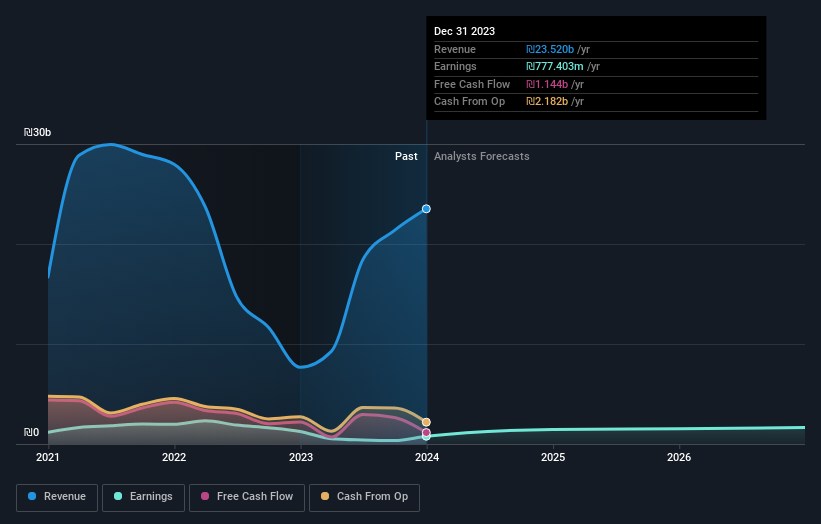The Phoenix Holdings Ltd.'s (TLV:PHOE) largest shareholders are retail investors with 49% ownership, private companies own 31%

Key Insights
- Phoenix Holdings' significant retail investors ownership suggests that the key decisions are influenced by shareholders from the larger public
- The top 21 shareholders own 50% of the company
- Institutional ownership in Phoenix Holdings is 20%
A look at the shareholders of The Phoenix Holdings Ltd. (TLV:PHOE) can tell us which group is most powerful. The group holding the most number of shares in the company, around 49% to be precise, is retail investors. Put another way, the group faces the maximum upside potential (or downside risk).
Meanwhile, private companies make up 31% of the company’s shareholders.
Let's take a closer look to see what the different types of shareholders can tell us about Phoenix Holdings.
Check out our latest analysis for Phoenix Holdings

What Does The Institutional Ownership Tell Us About Phoenix Holdings?
Many institutions measure their performance against an index that approximates the local market. So they usually pay more attention to companies that are included in major indices.
Phoenix Holdings already has institutions on the share registry. Indeed, they own a respectable stake in the company. This implies the analysts working for those institutions have looked at the stock and they like it. But just like anyone else, they could be wrong. If multiple institutions change their view on a stock at the same time, you could see the share price drop fast. It's therefore worth looking at Phoenix Holdings' earnings history below. Of course, the future is what really matters.

We note that hedge funds don't have a meaningful investment in Phoenix Holdings. Looking at our data, we can see that the largest shareholder is Belenus Lux S.a.r.l. with 31% of shares outstanding. Harel Pensions and Gemel Ltd. is the second largest shareholder owning 5.2% of common stock, and The Vanguard Group, Inc. holds about 2.4% of the company stock.
A closer look at our ownership figures suggests that the top 21 shareholders have a combined ownership of 50% implying that no single shareholder has a majority.
While it makes sense to study institutional ownership data for a company, it also makes sense to study analyst sentiments to know which way the wind is blowing. There is a little analyst coverage of the stock, but not much. So there is room for it to gain more coverage.
Insider Ownership Of Phoenix Holdings
While the precise definition of an insider can be subjective, almost everyone considers board members to be insiders. Company management run the business, but the CEO will answer to the board, even if he or she is a member of it.
Insider ownership is positive when it signals leadership are thinking like the true owners of the company. However, high insider ownership can also give immense power to a small group within the company. This can be negative in some circumstances.
Our data suggests that insiders own under 1% of The Phoenix Holdings Ltd. in their own names. But they may have an indirect interest through a corporate structure that we haven't picked up on. It is a pretty big company, so it would be possible for board members to own a meaningful interest in the company, without owning much of a proportional interest. In this case, they own around ₪5.9m worth of shares (at current prices). Arguably, recent buying and selling is just as important to consider. You can click here to see if insiders have been buying or selling.
General Public Ownership
The general public, who are usually individual investors, hold a 49% stake in Phoenix Holdings. While this group can't necessarily call the shots, it can certainly have a real influence on how the company is run.
Private Company Ownership
It seems that Private Companies own 31%, of the Phoenix Holdings stock. It's hard to draw any conclusions from this fact alone, so its worth looking into who owns those private companies. Sometimes insiders or other related parties have an interest in shares in a public company through a separate private company.
Next Steps:
It's always worth thinking about the different groups who own shares in a company. But to understand Phoenix Holdings better, we need to consider many other factors. Consider for instance, the ever-present spectre of investment risk. We've identified 2 warning signs with Phoenix Holdings , and understanding them should be part of your investment process.
If you are like me, you may want to think about whether this company will grow or shrink. Luckily, you can check this free report showing analyst forecasts for its future.
NB: Figures in this article are calculated using data from the last twelve months, which refer to the 12-month period ending on the last date of the month the financial statement is dated. This may not be consistent with full year annual report figures.
New: Manage All Your Stock Portfolios in One Place
We've created the ultimate portfolio companion for stock investors, and it's free.
• Connect an unlimited number of Portfolios and see your total in one currency
• Be alerted to new Warning Signs or Risks via email or mobile
• Track the Fair Value of your stocks
Have feedback on this article? Concerned about the content? Get in touch with us directly. Alternatively, email editorial-team (at) simplywallst.com.
This article by Simply Wall St is general in nature. We provide commentary based on historical data and analyst forecasts only using an unbiased methodology and our articles are not intended to be financial advice. It does not constitute a recommendation to buy or sell any stock, and does not take account of your objectives, or your financial situation. We aim to bring you long-term focused analysis driven by fundamental data. Note that our analysis may not factor in the latest price-sensitive company announcements or qualitative material. Simply Wall St has no position in any stocks mentioned.
About TASE:PHOE
Solid track record and fair value.


